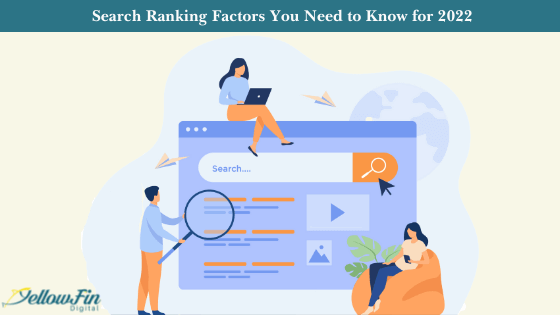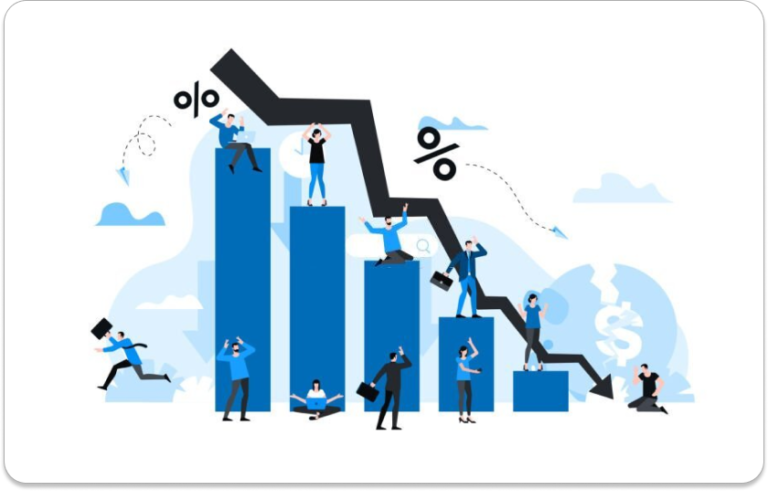The search landscape has evolved and continues to grow. Google’s commitment to the quality of search across the web has led them to develop several signals that impact whether your website appears in search results. Understanding these signals can help you improve your search ranking.
This is an overview of the search ranking factors in how search engines rank pages. It’s also a general description of how Google crawls and indexes content, which is essential to know as we look at how they evaluate content to determine how to rank it.
Six Factors That Search Engines Prioritize in 2022
Achieving a higher ranking in the search engine algorithm can feel like a guessing game, especially when figuring out how to get your site onto the first page of results. It can be challenging to decipher what factors Google uses to rank sites and even more challenging to figure out how to optimize your site to improve its ranking. But before you start wasting time trying every strategy under the sun, let’s take a look at some of the ranking factors which our experts from the SEO Agency have compiled.
1. Website Speed
We have shorter attention spans than ever before, and we have millions of other options for our attention online. This is why people don’t want to wait around for pages to load when searching online, so site speed is a big deal in SEO right now.
The faster your site loads, the better your chances of higher rankings. There are a few things you can do to improve your site speed:
- Optimize images to load faster and more efficiently on mobile devices
- Use only the necessary plugins
- Cache the content as much as you can so that you don’t have to generate it again
- Use a lightweight, user-friendly website design
2. Keyword Density
Keyword density is another ranking signal that has been around for quite some time. It measures how frequently keywords appear on your page compared to other words. But unlike what many think, Google looks more than the exact keyword match and towards the semantic side of things — understanding what your question is asking for and ranking results accordingly.
So apart from optimizing the page count for the primary keyword, search engines also look at the semantic keywords related to the primary keyword and the title. And with a healthy density of primary, secondary, and semantic keywords, a web page will be a step closer to increasing its ranking.
3. On-Page Elements
A search engine crawls a web page and records its content, including meta tags and links to other pages. The search engine then indexes this information to categorize and display search results.
Titles are one of the most critical elements affecting the ranking of a web page on search engine results. Therefore, titles should be carefully constructed with keywords that match a user’s search query.
URL is another important factor in on-page optimization. URLs should be kept short and readable by humans, and easily crawled by search engines. URLs should not include unnecessary parameters or parameters inferred from the page’s content—such as pagination or date in file names. Instead, it should have keywords relevant to the title and the content.
Meta tags are used to tell search engines what a website, article, or blog post is about. It should contain a short description of the page’s content and be displayed in search results under the title of your page. As such, meta tags should be accurate and reflect your website’s true nature and purpose, with the primary keyword included.
4. Intent Signals
Search engines will be able to access more ‘intent signals’ for each user — and make better predictions about what people are looking for online. To put it simply, Google will be able to work out the reason behind why people are searching for that particular search term and give results that match their intent.
So what does this mean for website owners like you?
Well, it means that your content needs to be optimized enough to reflect and address the searchers’ intent. For example, if someone is searching for ‘vegan doughnut recipes’, they aren’t looking to buy one; but to make one. On the other hand, when someone is searching for ‘vegan doughnut cost’, the intent behind it shows the consideration of buying a doughnut, probably if it comes with their budget.
So based on the primary keywords you target, your content should respond to the user intent.
5. AMP
AMP (Accelerated Mobile Pages) is an effort to provide faster web page performance for mobile devices without compromising user experience. There are many benefits of using AMP, and it’s one of the top search engine ranking signals.
AMP pages load faster, and AMP can increase your rankings on search result pages. In addition, the AMP content on your website will take less time to crawl than a standard website, which means users don’t have to wait for long to read your site’s content.
Google and other search engines favor AMP over the usual web pages primarily due to its mobile-friendliness.
6. Link Building
Links are one-way street that directs traffic from one website to another website. The more websites with links leading to your site, the better your chances of ranking high in search engines.
The sheer volume of links pointing to a site doesn’t matter much as their quality. If your site is linked from a page on another site that gets a lot of traffic and has a critical domain name, that’s excellent. On the other hand, if your site is linked from a page on another site with little traffic and isn’t very reputable, that’s bad.
So make sure to conduct regular link audits to weed out the wrong links to your site and build links from authoritative websites.
Wrapping Up
Keeping up with all of the changes Google makes to its search algorithm can feel like a full-time job in and of itself. If you’re finding yourself in that spot, Our SEO agency Corpus Christi has compiled these six definite signals that search engines use for ranking. Make sure to include as much as you can to boost your rankings high.



